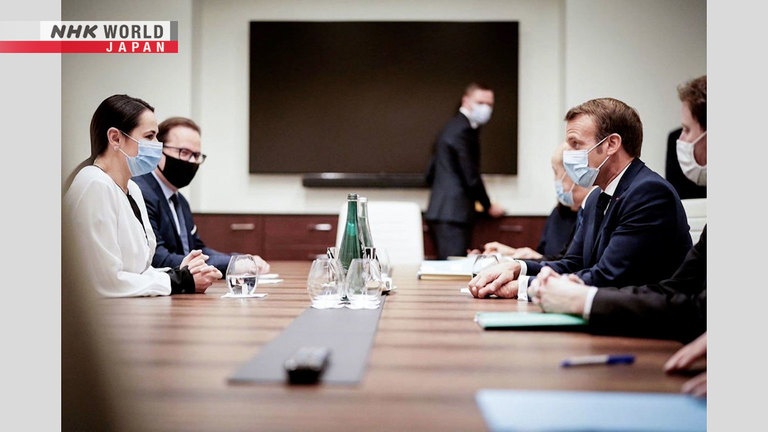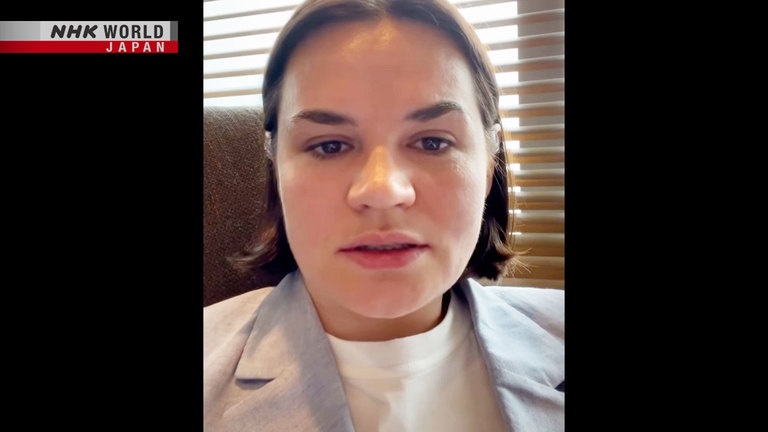Confronting "Europe's Last Dictator": Svetlana Tikhanovskaya / Exiled Belarus Opposition Leader
How and when will Belarus, long ruled by the iron hand of a dictator, achieve democracy? Svetlana Tikhanovskaya, the exiled Belarus opposition leader, talks to us from Lithuania.



Transcript
Direct Talk
For almost 30 years,
Belarus has remained under the control of
President Lukashenko's authoritarian regime.
In opposition to this,
Svetlana Tikhanovskaya
ran for president in 2020,
calling for democratization.
I am tired of being silent.
I am tired of being afraid.
President Alexander Lukashenko
who won his sixth consecutive term
It was declared that
President Lukashenko had been re-elected.
Seven thousand protestors who claimed the
election had been rigged were imprisoned,
and Svetlana was forced to leave the country.
Russian President Vladimir Putin
The Russian government,
which backs the Lukashenko administration,
has also joined the ranks
and put her on its international wanted list.
Having fled to Lithuania,
Svetlana continues to work
with Western countries
to call for democracy in Belarus.
We must restore everything
that's been destroyed in the last 27 years.
Confronting "Europe's Last Dictator"
Since fleeing Belarus,
Svetlana has been working
from a small office in Vilnius,
in the neighboring country of Lithuania.
Tikhanovskaya's office
The Belarusian democracy representation
she leads has been accredited
by the Lithuanian Ministry
of Foreign Affairs.
Against the backdrop of so many people
desiring the democratization of Belarus,
Svetlana continues to meet
dignitaries from various countries.
In addition, she works closely with
international human rights organizations
to resolve the plight
of the Belarusian people.
Well, we cannot issue any visas.
In reality,
diplomatic representation
gives us the opportunity
to be represented at the
diplomatic level in other countries
and to work more closely with embassies.
We now have access to any embassy
and to any international structure.
The range of work is very wide,
from helping the families
of political prisoners,
to helping those people
who have left the country,
to maintaining the union
of democratic forces,
and the promotion of the Belarusian
agenda at the international level,
and, of course, the fight against the regime.
My main task is to be
the voice of the Belarusians
in the international arena.
So my job is to be like an umbrella,
so that people work together,
with one agenda.
Our agenda hasn't changed since 2020:
the release of all political prisoners,
stopping repression,
and holding new, fair elections.
As a matter of fact,
the Belarusians know
that the majority of Belarusians
voted for me in the elections of 2020.
But I didn't declare myself at the
international level as the president,
because that wouldn't really change anything.
A dictator only holds power by force.
Therefore, the Belarusians call me
the leader of democratic Belarus,
the leader of the opposition,
the leader of the new Belarus, and so on.
But, in fact, it makes little difference
what they call you.
It's what you do that matters.
Svetlana Tikhanovskaya
was born in Belarus in 1982
during the time of the former Soviet Union.
Svetlana Tikhanovskaya
1982 Born in Belarus
She was 10 when the Soviet Union collapsed.
Some former Soviet countries
became democratic
but Belarus remained a Russian ally.
Svetlana Tikhanovskaya
1982 Born in Belarus
1991 Collapse of the Soviet Union
As a student, she helped children
affected by the Chernobyl nuclear disaster.
Then she worked as an English interpreter
before getting married
and raising two children.
Svetlana Tikhanovskaya
1982 Born in Belarus
1991 Collapse of the Soviet Union
2004 Graduated from Mozyr State Pedagogical University
Worked as an English interpreter
2005 Married Sergei Tikhanovsky
In 2020, her dissident blogger husband,
Sergei, ran for president,
but he was arrested and imprisoned
three months before voting day.
So Svetlana ran in his place at short notice.
However, the authorities
announced that the incumbent
President Lukashenko had been re-elected.
Citizens protested, claiming
that the election was rigged.
However, the protests
were thoroughly suppressed,
and Svetlana was forced to leave the country.
August 19, 2020
In response, the EU immediately announced
that it would not accept
the results of the presidential election.
So first of all,
I ran in place of my husband,
who was disqualified from
being a presidential candidate
because he had become,
shall we say, "dangerous" to the dictator.
I did it out of love for my husband.
My first step was only for my husband.
I didn't think about
the future of the country,
I didn't think about revolution, and so on.
But when it became clear that hundreds of
thousands of Belarusians were involved,
there was a feeling that people had woken up,
and I was just one of the awakened people.
Even now, two years after the election,
the number of dissidents arrested by
the regime shows no sign of decline.
The regime also suspended dissident
media outlets as extremist organizations
and detained more than 100 journalists.
Through social networking services,
the voices of Belarusian citizens
are delivered to Svetlana.
Today I spoke with a girl who said,
"I am calling from hell."
I thought she was calling from Ukraine,
where the battle is going on,
but she was calling from Minsk.
I fully realized
that Belarus is now perceived as hell.
She tries to listen to
all the comments like this
and respond with messages of hope.
Tikhanovskaya's official Instagram
Results of our visit to Portugal:
facilitated migration, visas,
support for our European perspective.
Tikhanovskaya's official Instagram
Anyone is welcome to talk to me and my team.
We are primarily relying on digital tools
of some kind to communicate with...
that is... to coordinate our actions
and create pressure points on the regime.
In fact, I try to communicate
with Belarusians
who are inside Belarus every day,
so as not to lose touch with reality.
Because sometimes everything seen from abroad
seems much different than it really is.
And for me it's very important to hear
the problems that Belarusians have.
I try to spend maximum time on this.
It's happening on social networks, through
Telegram channels, and in real life as well.
Every week I have what I call "office hours,"
when Belarusians can come to me
with their problems and questions.
And there are really many questions,
ranging from, "When will we win?"
to "Svetlana, I am so glad to see you,
I love you, I have no questions."
I mean, you know,
the most important thing
is this exchange of energy.
It's as important for me
to communicate with people
as it is for people to understand
that no one has given up,
that the fight is still going on.
Since Svetlana started her
steady outreach to the Belarusian nation,
the movement for democratization
has not spread outwardly.
According to the results of a survey
conducted by a British research institute,
the approval rating for
Lukashenko's authoritarian
regime continues to remain at around 27%.
I think that it depends,
everything depends on the person who comes
into power in a window of opportunity:
Other countries happened to have democratic leaders take over as head of state.
In Belarus we probably weren't so lucky.
Lukashenko, who was completely pro-Soviet
and valued Soviet methods,
took over as head of state.
Since then
he has built a very strong
fear machine around himself.
And so the regime always survives on fear;
it survives thanks to violence.
When people live in constant fear
that any answer to an
inconvenient question will result in,
say, a prison sentence,
then of course people are sometimes inclined
to give the wrong answers to questions.
They realize that there may be
consequences behind them.
So asking people if they trust
Lukashenko is out of the question.
Fear can manipulate people's answers
And one of the main tasks
is to communicate with those
who are still supporters of the regime.
Of course, it is not a
one-on-one conversation,
because such people will
never come to communicate.
But by providing explanations through
social networks and other means,
we try to involve that audience as well.
We try to tell them
how our country may look like
when we have democracy,
when people will take responsibility
for some decisions,
that the government will then make.
And, we have to look for more and more new
methods of work and explanations, you know,
about how can our country develop,
what path it should take if we have a
governor who is not thinking about himself,
not about his benefits,
but thinking about us, the people,
and create a comfortable
working environment with decent wages.
How will our towns and villages look,
when the leader actually thinks about us,
not about his own enrichment.
And in such very small steps,
I hope that people,
maybe unconsciously, will come.
Here there's more emphasis
on teaching, on education.
President Lukashenko follows President Putin.
Belarus conducted joint military exercises
with Russia prior to the
Russian invasion of Ukraine.
While Western countries have declared
their support for Ukraine,
Belarus continues to support Russia.
President Lukashenko even changed
the Belarusian constitution
to allow Russia to bring in nuclear weapons,
just before President Putin
hinted at their use.
In response, Svetlana
appealed to the Belarusian public.
Tikhanovskaya's official Instagram
Lukashenko is helping to
fight this war with our taxes.
We understand
that the future of Belarus
may also depend on the results of this war.
Because Lukashenko has become
a collaborator in this war.
He offered our territories to attack Ukraine.
The Lukashenko regime now,
and Lukashenko himself in particular,
is paying a debt to the Kremlin for
the fact that it supported him after 2020.
And Lukashenko, as a puppet,
has to do what he is told from the Kremlin.
We try in every way we can
to help Ukrainians to win this war.
Because when Ukraine wins,
it means that the
Kremlin will be in a weak position
and Lukashenko will be in a weak position.
And then we will have a window of
opportunity to overthrow the regime.
Svetlana believes that the Lukashenko regime
will grow weary of supporting Russia
as the war in Ukraine drags on.
She says she is waiting for that moment.
I will go back to Belarus
at the moment when I feel the regime
is at its weakest point.
Whether it will be safe or
dangerous is another question.
But when a wave of Belarusians
against the regime rises again,
when we have a lot of tools
to overthrow the regime,
if my presence in Belarus is necessary,
I will go.
Probably without my children,
because there could be
any kind of consequences.
But I must fulfill my mission till the end
During the election campaign,
I promised the Belarusians
that my role would be to lead
our country to new, fair elections
together with the Belarusians.
Because many candidates
were in prison during the election.
And then during these new elections,
the Belarusians will be able to
choose a new president.
At the moment, I'm not planning to
run in a new presidential election.
So we will build a beautiful country,
where being human is above all else,
and I hope very much that
at least the next generation,
our children, will be able to grow up happy
and without fear.
We asked Svetlana
what word has supported her most,
as she continues her never-ending battle.
It's the word "trust."
"Trust."
Because we want to build our country,
the new Belarus,
based on trust in the people,
on trust in the authorities,
and on trust in the state.
What do you most want to do right now?
Go back to Belarus and hug my husband.
Trust